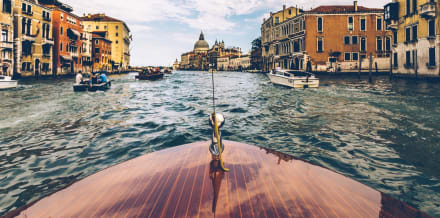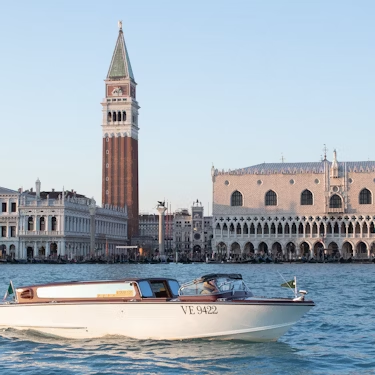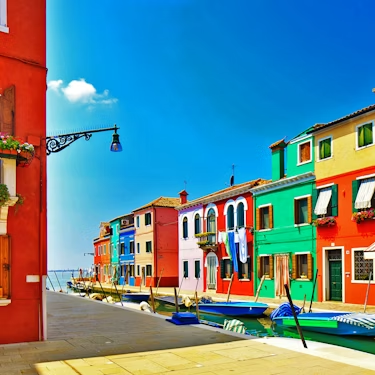More about: Venice in 7 Days: a guidebook for discovering the city in detail
There is so much to do and so many places to see in Venice that organising a long trip to the city can be complicated. My advice is to dedicate one day to each district or neighbourhood, so you can take it all in at your leisure. You are going to spend a whole week in the city of the gondolas, so you will have enough time to get to know both the main island and its surroundings.
Of course, there are characteristic places like St. Mark's Square or the Rialto Bridge that will have a special place in your itinerary, but Venice has many other secrets, corners and traditions waiting for you. Shall I tell you my favourites? To make it easier for you, I have organised what would be my perfect 7-day visit to Venice.
Day 1: Discover the surroundings and art of St. Mark's Square
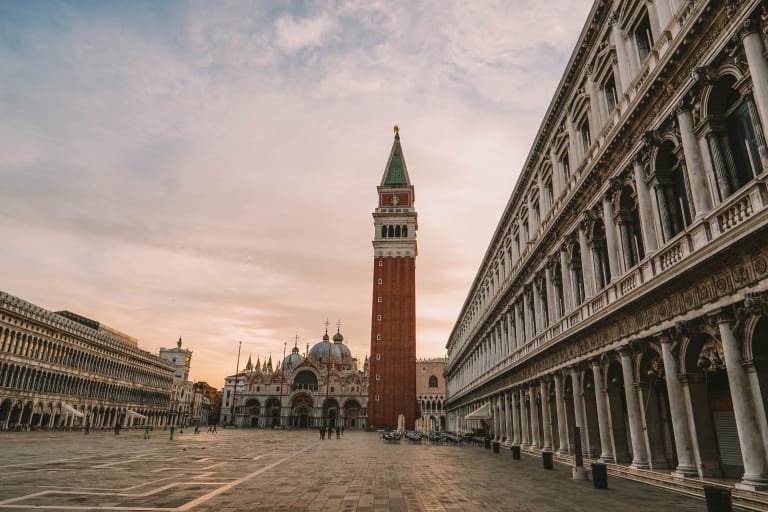
When you arrive in Venice from the airport and take to the streets to explore, you'll quickly realise that a central point is St Mark's Square. Around it is where the life of the Italian city is generated, as its approximately 100 square metres are home to some of the most emblematic buildings in Venice, such as the Doge's Palace, for which you can book tickets in advance, or St Mark's Basilica, for which you can also get your tickets in advance. Without a doubt, this square has to be the first stop during your trip.
Feel like a duke in the Doge's Palace
The first stop should definitely be the former Duke's Palace, where the city's rulers stayed for years. Although tickets to see the Doge's Palace are a bit expensive (from 40€), including access to the Correr Museum, the Archaeological Museum and the Library, it will be well worth it. If you like culture, you'll enjoy this visit, although I recommend booking in advance and, if you can, with a skip-the-line option, as the waits can be quite long.
The interior of the Doge's Palace is incredible and you'll get an idea of the luxury and decorative taste of the Renaissance era. You will walk through such important rooms as the old voting rooms and the armoury. As if this were not enough, from the Palace you can cross the famous Bridge of Sighs and reach the dungeons, where the famous Casanova was imprisoned.
Experience the art of St. Mark's Basilica
Before ending the morning, it is the ideal time to visit another of the emblematic buildings of St. Mark's Square, the Basilica. As soon as you enter, you will be surprised by its golden hue, which gives a special light and brightness to every corner, and the altar, under which St. Mark rests. If you go with a specialised guide, which I recommend you do because you can enter without queuing, he or she will explain each of the images on the mosaics on the walls.
Although entry to the Basilica is free, there are areas, such as the Museum and the Horses of St Mark, for which you have to pay a separate entrance fee (approximately €5). My advice is not to miss the opportunity to visit this room, which is where you will find most of the mosaics as well as the original bronze and gold sculptures of the horses.
Listen to the twelve chimes of midday from above

With a special ticket (about 10€) you can climb the bell tower of the Basilica. I personally was fascinated by the views of Venice from 100 metres up, so I recommend you book a ticket to see them yourself. In addition to the panoramic views, if you're on the rooftop at midday (or any other time for that matter), you'll have an incredible vantage point to listen and watch the two little figures of the St Mark's Astronomical Clock tell the time.
It may not seem like a big deal, because you can hear the chimes of the clock from anywhere else in the city, but I assure you that observing the delicate art and detail with which the clock was designed and crafted is a real treat.
Take a lunch break around San Marco
When it's time to eat, you're sure to be hungry, and the truth is that there are many gastronomic options around St. Mark's Basilica. Be warned, these are tourist and historic establishments, so be prepared to pay up to €10 for a drink. Even so, there are places that I liked a lot and that's why I want to recommend them to you.
After lunch, you must have a good Venetian coffee, which is made with cream and is usually quite strong. In short, just what you need to recharge your batteries and get on with your first day in Venice.
Learn about the history of Venice at the Correr Museum

If you've bought a ticket for the Doge's Palace, you should know that it includes access to the Correr Museum. Although there are many Venetian museums, this one in particular has always caught my attention. Why? Because its rooms will take you on a journey through the history of Venice from the time it was founded until the moment it was annexed to Italy.
A visit to the Correr Museum will give you a better understanding of the basic facts about the city, which I think is essential before continuing your visit to Venice. The Archaeological Museum is also part of the Correr Museum, where you can see sculptures and other works of art dating back hundreds of years.
Watch the sunset on a Grand Canal Cruise
The Grand Canal is definitely the place to book a gondola ride. Aboard Venice's quintessential mode of transport, you'll discover the history of the city from your gondolier or a local guide. Along the way, you'll see buildings such as the Gothic Ca' d'Oro mansion and pass under famous Venetian bridges such as the Rialto.
If you book your gondola ride on the Grand Canal in the late afternoon, you'll have the luxury of watching the sun set as you cruise the waters at your leisure. This is definitely the best way to end your first day discovering Venice.
Day 2: Experience the youthfulness of the Dorsoduro District

They say it's the preferred area for young people, but I think Dorsoduro is enjoyable at any age, which is why I'd like to recommend that you dedicate a day to exploring it. In its streets you will not only find the Accademia Gallery of Venice, but also beautiful churches and palaces.
Contemplate all the art of Venice in the Accademia Gallery
When you cross the Accademia Bridge, made of wood because it was originally meant to be temporary, one of the first places you will see is the Accademia Gallery. In this museum, which costs about 4€, you'll find the largest collection of Venetian art, with works by artists such as Bellini and Titian.
Did you know that in 1817 this museum was created to house all the works of Venice? Yes, that's why this visit is a must if you want to admire the more than 800 paintings on display.
Continue the art tour at the Peggy Guggenheim Gallery
It's clear that art plays an essential role in Venice, but don't think that all the works have centuries of history. In fact, I recommend a visit to the Peggy Guggenheim Collection, which is located inside the Palazzo Venier dei Leoni and features works by Picasso, Magritte and Pollock.
If you love painting and enjoy modern art, this is a must-see during your visit to Venice and the Dorsoduro neighbourhood.
End the morning at the Church of Santa Maria della Salute

When you arrive in the Dorsoduro neighbourhood, I am sure that there is one building that will catch your attention above all others: the Church of Santa Maria della Salute. Moreover, its dome will be familiar to you, as it appears on most postcards of the city. This church is one of the most important religious buildings in Venice and was built to celebrate the end of the plague, so you can imagine its symbolism. The entrance fee is approximately 4€, so it is quite affordable.
Apart from the fact that its exterior will leave you open-mouthed, I recommend you go inside because its sacristy exhibits Tintoretto's famous painting of "The Marriage at Cana", as well as other paintings by this painter and others such as Titian.
Stop for a bite to eat and a bite to buy
If there is a lively square full of shops and restaurants in Dorsoduro, it is Campo Santa Margherita. Without a doubt, it is a great place to have an aperitif or even buy some fresh produce from the street stalls that are set up there every morning.
But in addition to the rich gastronomy of Santa Margherita, sitting on one of its terraces you can admire the facades of the baroque buildings that surround it, among which I recommend you pay special attention to the ancient Scuola dei Varoteri and the Scuola Grande dei Carmini, which you can visit if you are interested by purchasing your tickets.
Visit the legendary Palazzo Ca' Rezzonico
It's impossible to let a day in Venice go by without seeing one of its palaces, but the great thing about the Ca' Rezzonico is that it's one of the few that can be visited from the inside. I'm sure you've seen its façade in a photo before, as it is located on the banks of the Grand Canal and is extremely beautiful.
Although it is obviously smaller than the Doge's Palace, it is equally interesting to visit, especially because inside you will find the Museum of the Veneziano Settecento, where you will find objects used by the city's nobles. You can also visit an old pharmacy.
Day 3: Get to know the naval area of the Castello district

Of all the districts in Venice, Castello is the largest. To get there you'll need to take a vaporetto, so you have an excuse to try this characteristic means of transport. This neighbourhood combines the luxury and crowds of one of the city's most touristy areas with the poorer streets around the Dockyard.
Walk among the tombs of the Basilica of Santi Giovanni e Paolo
It is quite clear to me what has to be one of the first stops: the Basilica of Santi Giovanni e Paolo. Not only because it is the largest church in Venice, but also because on an artistic level it is an emblem. For one thing, it houses the tombs of the Doges, so you can imagine the rich decoration that keeps the ancient Venetian dukes company. The entrance fee is symbolic (around 2€) and is meant as a donation to the Basilica.
When you have finished visiting the enormous interior space of the basilica, its tombs and works of art, I recommend you go outside to the square, which has the same name. It is home to the statue of Bartolomeo Colleoni, an impressive Renaissance piece by the sculptor Verrocchio. The square is also home to the Scuola Grande di San Marco, a Renaissance building now used as a hospital.
Visit the Naval Museum of the Arsenale Complex
Did you know that the site where the Venice Biennale was held years ago was once a naval complex? That's right, this was the use of the Arsenale, which explains why it now houses theNaval History Museum. This old shipyard is a highly recommended place to end the morning watching the evolution of Venetian gondolas. Admission costs around 10€ and, even if you're not particularly interested, this is where warships were repaired and built.
Around the Arsenale you can also visit other historic buildings, but above all I recommend you relax in the Gardens, which were designed by Napoleon Bonaparte. There you can escape the hustle and bustle of the city for a while.
Take a break to shop and eat at the market on Via Garibaldi

You're probably starting to feel peckish, and at such times there's nothing like enjoying freshly bought produce from the market. Garibaldi is open on weekdays from the crack of dawn, although the fruit, vegetable and other fresh food stalls begin to close at midday. However, in this street, one of the widest and straightest in Venice, you can also find fixed food outlets in Venice at good prices.
As well as grabbing a bite to eat, you can also do some shopping. Although it's a fairly large and central street, the shops you'll see here are more local, so it's a great opportunity to pick up some special souvenirs.
Go back in time at the Acqua Alta Library
In recent years technology has taken over our days, so I recommend leaving your mobile devices in your backpack for a while and lose yourself among the shelves of books at the Acqua Alta Library. The building is located in the heart of the Castello district and has a very special feature: sometimes the shelves are replaced by gondolas and bathtubs.
As you can hear, when floods come to Venice, something very common at certain times of the year, this bookshop turns into an indoor lagoon and the best way to save your books is by putting them in bathtubs or gondolas. It seems unbelievable, but if you goto Venice in winter and see it for yourself, you'll be able to see for yourself.
Day 4: Stroll through the tiny San Polo District

The San Polo district is one of my favourites because of its beauty and culture. This district is the smallest in Venice, but it is also one of the oldest, as it was here that the first inhabitants of the city settled as it was a flood-free area. You will find it in the immediate vicinity of the Rialto Bridge.
Cross the Rialto Bridge towards the market
It was clear that this was going to be one of my first recommended stops, as this famous bridge deserves to be crossed at least once. Besides being one of the most special, Rialto is the oldest of the four bridges that cross the Grand Canal. It is characterised by its curious portico and, historically, for having been an economic centre.
Once you have crossed the bridge, if you do it in the morning, you will have the opportunity to visit the Rialto market, which has been held since the beginning of the 11th century. If you haven't had breakfast yet, you'll find it hard to keep your appetite down when you see how good the fruit looks.
Near the bridge is the Palazzo Mocenigo, an 18th century nobleman's house museum where you can discover a collection of period clothing and accessories, as well as rococo furniture and frescoes.
Enter Santa Maria Gloriosa dei Frari and discover its interior
Once you have fully immersed yourself in San Polo, you have to go to the Frari, the name by which this church is known. What do I mean? Its exterior is rather dull, without much ornamentation. However, when you enter the interior (entrance costs approximately 3€), you will be positively surprised.
One of the most striking aspects is the stained glass work that runs along the walls of Santa Maria Gloriosa, although the main attraction is undoubtedly the painting of "The Assumption" by Titian, which presides over the altar.
Get your strength back and visit the Scuola Grande di San Rocco

After a brief stop for lunch at one of the rustic taverns in the San Polo district, it's time to continue your Venetian artistic journey at San Rocco, which is no slouch when compared to the Sistine Chapel. The reason? Its interior was decorated by Tintoretto, so be prepared to contemplate a work full of colour, light and detail.
There is only one drawback, although the building is quite large and its architecture admirable, only three rooms can be visited. Still, if you like art like me, I highly recommend you go inside (the approximate entrance fee is €10).
Enjoy the Venetian night with a typical dinner
The whole area near the Rialto Bridge is one of the most traditional in Venice, so I can't make a better recommendation than to take advantage of being there to book a gastronomic tour that allows you to taste the most typical dishes of the city, listen to legends and also get to know the nightlife in Venice.
During the three hours or so that these tours last, you will tour small bars where they will let you try some "cicchetti" or, what is the same, small portions of fish, meat or vegetable dishes. Of course, the food is best served with a glass of wine, so you'll also get to taste some of Venice's delicacies.
The best thing is that when you book this type of tour of Venice you'll be accompanied by a professional guide who, as well as doing the food tasting with you, will tell you the secrets and legends of the city.
Day 5: Discover the best viewpoint on San Giorgio Island
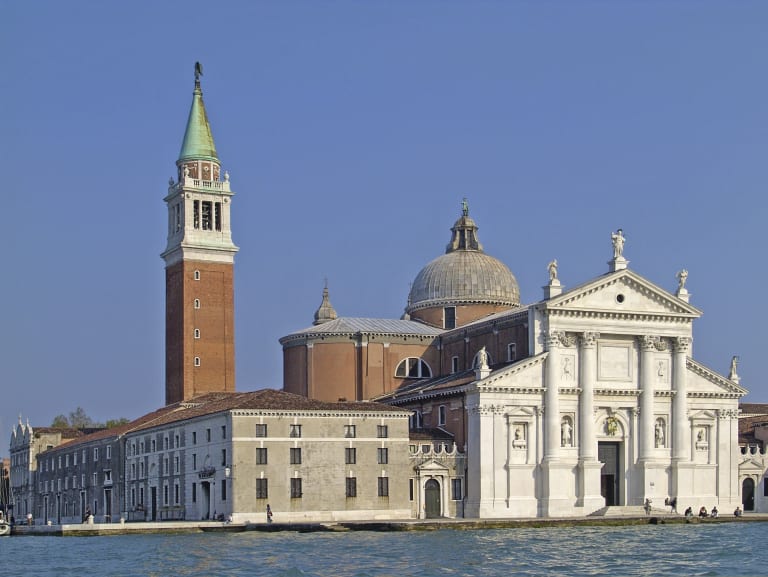
This district is actually an island, but it has three points that from the very first moment caused me a lot of interest and I'm sure you will too. On the one hand, in San Giorgio Maggiore there is a monastery and a church that are well worth a visit. But what's more, from this island you will have incredible views of Venice.
The immensity of the Basilica of San Giorgio Maggiore
This large building is striking from afar, as it can be seen from St. Mark's Square. Once you are on the island, it is even more imposing. Its marble construction was the work of Andrea Palladio and mixes several classical styles, although its inspiration is mainly Roman.
Its exterior is fascinating, but inside you will also find a lot of art, in particular several works of Italian Mannerism. My advice is that you should not forget to admire these pieces even if your main objective is to climb to the top of the bell tower, from where you will have an incredible panoramic view of Venice. The photos you will take from there are priceless, believe me, and will make the approximately €6 entrance fee well worth it. After all, this is said to be the best viewpoint in the city for a reason.
Take a vaporetto and visit Giudecca Island
Venice is a big island, but around it there are other equally interesting, if smaller, islands. Giudecca is one of them, so I recommend you take vaporetto number 2, which takes you there from San Giorgio, and spend the afternoon there visiting two of its most important buildings: the Convent of the Zitelle and the Church of Santissimo Redentore.
The Convent of the Zitelle has a lot of history behind it, as it was erected to house women in need. It is now a hotel, but the name has been kept. The Church of the Santissimo Redentore, designed by Andrea Palladio as a reminder of the terror caused by the plague in the city, which was considered a divine punishment. Its architecture is notable for its imposing Roman pediment.
Day 6: Day trip to Murano, Burano and Torcello

If you're staying in Venice for a week, I recommend a day trip from Venice, especially to the area of Murano, Burano and Torcello, three nearby islands where you can get a first-hand look at some of the more traditional crafts.
Learn the art of glassblowing on Murano Island
Have you ever been fascinated by watching how glass is made? Through the air, Master Artisans design glass objects in seemingly impossible shapes. During your visit to Murano you will have the opportunity to visit an old factory to see a live demonstration of this work. If you book an excursion that includes a workshop, you'll come back with a piece you've made yourself, thanks to the advice of the glassblower and guide who accompany you.
In Murano you can also visit the Cathedral of Santa Maria and San Donato, a Byzantine-style building that is part of the city's heritage. My advice is to go with a guide who will explain all the allusions and allegories that the mosaics on the floor and walls make to religious motifs.
Visit the fishing village of Burano Island
This island is known for its handmade lace, but also for being a beautiful fishing village. As you can imagine, the quality of the fish in Burano is very high, so I recommend you take advantage of your visit to sit down in a restaurant in the port and savour the local produce.
When you've recovered your strength after lunch, wander through its streets full of colourful little houses and head for its bell tower, which you'll recognise instantly because it's slightly inclined. Don't worry, there is no danger of falling, as the structure was stabilised after the Second World War.
Tour the throne of the Huns on the Island of Torcello
Although only 20,000 people live there now, Torcello was actually the first inhabited island and therefore has the first church in Venice, the Church of Santa Fosca. The reason why there are not so many people now is that hundreds of years ago, due to a malaria epidemic, the population declined and power shifted to Venice.
Although its importance is no longer the same, in Torcello you can get an idea of what the area was like years ago, as it seems that time has never passed. In fact, in the town square lies what is believed to have been the throne of Attila, King of the Huns.
In a couple of hours you will have toured Torcello and be more than ready to head back to Venice.
Day 7: Take a tour of Venice Lido
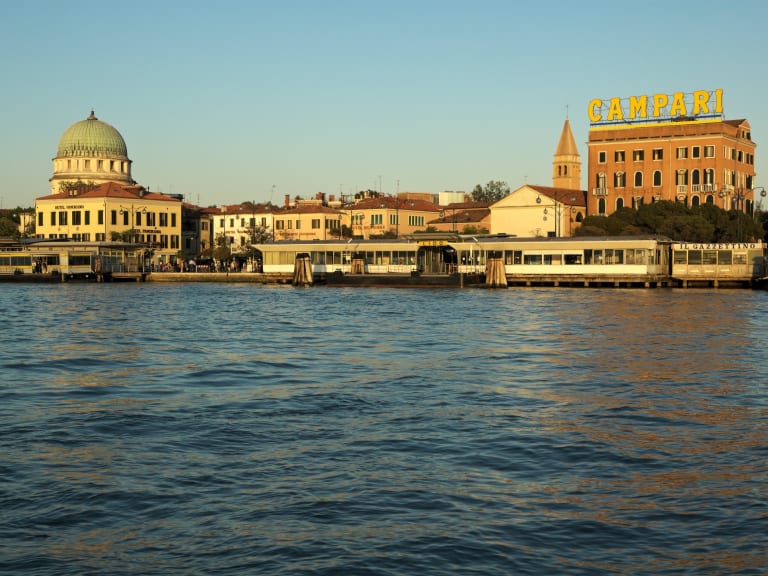
On your trip to Venice you're sure to love seeing the more traditional areas of the city but, if I may give you a tip, you can't leave without visiting the Lido or, in other words, one of the most fashionable summer destinations in the area. This island is only a 10-minute vaporetto ride from Venice (lines 5.1 and .1), making it the perfect place to spend your last day in the city.
Take a stroll along the Lido beaches
If you're heading to Venice in the summer, there's no better way to enjoy the summer months and soothe the heat than with a swim at the Lido beaches. My favourite (and many people's favourite) is Alberoni beach, whose dunes are breathtaking. If you are travelling to Venice with children, a walk and a swim at this beach is a great idea.
Be aware that these beaches are very crowded, so keep this in mind when you go because you may find many Italians who are going to spend their holidays there, as well as tourists like you and me. My advice is to go early in the morning.
Feel like a movie star on the northern Lido
I'm sure you've heard of the Venice Film Festival and images of big movie stars arriving by speedboat come to mind. Well, you can have a similar experience if you head to the Palazzo del Cinema, which is where the event is held every year. If you go during August in Venice or September in Venice, keep in mind that this is when the festival takes place, so access may be restricted.
If the glamour of cinema isn't your thing and you prefer something more traditional, head to the San Nicolò neighbourhood, also on the north side of the Lido. There you can enter the monastery and church, where the relics of St Nicholas are kept, although you may be more familiar with it as the location where the film Death in Venice was shot.
Taste the best fish on the Lido

In the centre of the Lido is Malamocco, a small fishing village where I recommend a lunch break. Of course, the star dish in any of the restaurants in the area is fish, but you can also try more typical dishes such as pizza.
Malamocco is one of the most authentic areas of the Lido, so the best thing to do is to stroll through its streets and breathe in the tranquillity of the area. As you wander around, you're sure to be surprised by the houses and buildings, which have a unique yet charming style.
Cycle through the murazzi
Fancy a bit of exercise? On the Lido you can rent a bike to ride along the murazzi, the barriers that were set up to prevent the erosion of the island and to ensure navigation in its waters.
A bike is definitely a great way to get to know the Lido and along the murazzis you will have the chance to see the waves of the Adriatic Sea on one side and the town centre on the other. You will feel like a real Italian!
Dine and play at the Venice Casino
Fancy experiencing the glamour and sophistication of the Lido from the inside? Then you must go to the Venice Casino. But if you do, remember to dress for the occasion, as they have a dress code and won't let you in if you're wearing a beach look. Even if you don't gamble, the inside is quite spectacular, so my advice is to go inside to experience the atmosphere and, if you can afford it, dine there.
The restaurants in the Casino are, of course, luxurious and you can enjoy first class dishes. It's not for everyone's budget, but at least you can have a drink and admire the chandeliers and crystal chandeliers.
And to get around as quickly and safely as possible, the best thing to do is to get a city transport pass that will allow you to move freely around Venice without any problems. You will be able to hire the hours that suit you best and travel unlimited vaporetto and buses.
How much are you looking forward to spending a week in Venice? I hope these tips and the full itinerary will help you organise your holiday in the city of gondolas. Enjoy it!
